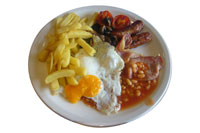Fat is a compound found in food. It is one of three types of energy that the human body uses, the others are carbohydrates and proteins. There are 9 kilocalories (calories) in one gram of fat. Carbohydrates and proteins each have just 4 kilocalories per one gram. Too much of any of these energy sources can lead to weight gain, but since fat provides more than double the calories per gram than the others, weight gain is often from fat. "Oils" is the term used to refer to fats that can be liquid at normal room temperature. "Fats" is the term usually used for fats that are solids at room temperature. While "Lipids" is the correct term for both liquid and solid fats. Fat is important for the human body. It provides us with energy, and it helps the body use vitamins A, D, E, and K. These vitamins are fat-soluble, meaning they can only be digested, absorbed, and transported with the help of fats. Fat is also vital for maintaining healthy skin and hair, protecting our body's organs against shock, maintaining body temperature and promoting healthy cell function. Fat also gives our foods a lot of their flavor and texture. There are different types of fat: saturated fat, unsaturated fat and trans fat. Saturated fats are generally solid at room temperature and are natural fats from animal or plant sources. Saturated fat is an unhealthy fat that raises blood cholesterol and increases the risk of heart disease. Foods high in saturated fat include: fatty cuts of meats, skin from poultry, full fat dairy products like butter, milk, yoghurt, cheese and cream. Many take-away foods and processed foods, such as pies, pastries, doughnuts, cakes and biscuits. Saturated fat is also found in tropical oils, like palm kernel or coconut oil. Unsaturated fats are usually liquid at room temperature and are found in vegetable oils. There are two main types of unsaturated fats, polyunsaturated (liquid in fridge too) and monounsaturated fats (solidify in fridge). Unsaturated fats, in moderation, are actually necessary for good health. They help lower blood cholesterol levels and can reduce the risk of heart disease and stroke. Polyunsaturated fats include: Omega-6 fats such as soybeans and oils, sesame and sunflower seeds, most nuts and their oils, corn oil, omega-3 fats found in fatty fish such as salmon, mackerel, trout, herring, sardines and tuna. Monounsaturated fats include: Canola oil, peanut oil, olive oil, avocados and nuts like almonds, pistachios, pecans and cashews. Trans fats are rare in nature. They are created in food by processing (partially hydrogenating) other types of fats, giving them a different structure. For example when margarine is made from oil. Trans fats behave like saturated fat, they are the most unhealthy fats to eat and can cause heart disease. Trans fat adds texture and flavour to food, they are usually found in commercially baked goods, fried foods, frozen foods and processed foods like salty snacks, donuts and chocolate coatings.
| | |  | | More Food Facts: | | | | | | | | | | | | | Fat Facts | | | | | | | | | | | | | | | |
|